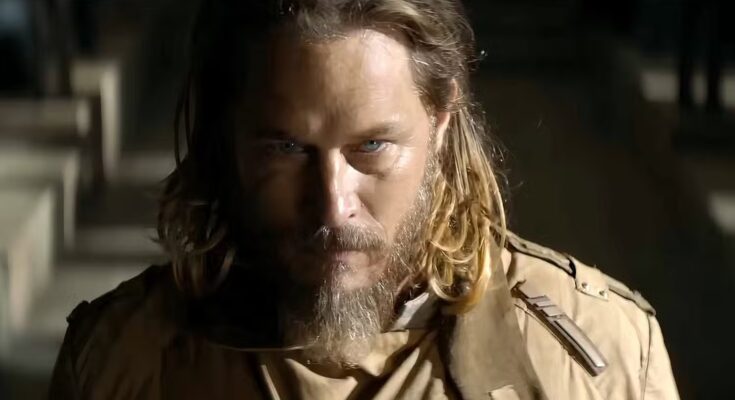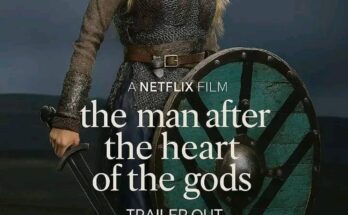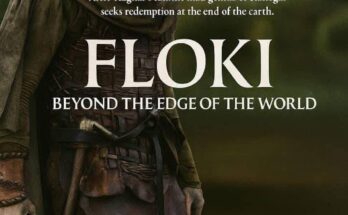Travis Fimmel Gets To Play A Ragnar-Like Character In Dune: Prophecy
In Dune: Prophecy, Travis Fimmel portrays Desmond Hart, a seasoned warrior who has survived several tours on Arrakis. In episode 1 of Dune: Prophecy, Desmond Hart meets with Emperor Corrino, stating that he was the only survivor of a recent attack on Arrakis. While it is easy to draw similarities between Hart and Duncan Idaho from the Dune movies, it appears that Desmond Hart has more villainous qualities to him. In Dune: Prophecy, Hart claimed that the attack on Arrakis was not by Fremen, and was actually orchestrated by the Emperor’s supposed allies.
While Ragnar could be a vicious, brutal character, Hart seems to be taking things a step further in his villainy.
It seems like Desmond Hart is aware the Bene Gesserit are orchestrating events in the Imperium, and is determined to oppose the group. Ragnar Lothbrok and Desmond Hart both appear to be warriors destined for greater things. However, while Ragnar could be a vicious, brutal character, Hart seems to be taking things a step further in his villainy. At the end of Dune: Prophecy episode 1, Hart uses a mysterious power to kill the heir of House Richese, who was just a child, and Reverend Mother Kasha, an important member of the Bene Gesserit.
Travis Fimmel has always had a unique on-screen energy, a blend of rugged physicality, intensity, and that almost unteachable ability to make a character feel both commanding and unpredictable. Ever since his breakout role as Ragnar Lothbrok in Vikings, he has been celebrated as an actor who can balance brutality with vulnerability, power with humanity. Now, years after his iconic performance as the legendary Viking king, Fimmel is returning to a role that gives him a chance to recapture some of that magic. In Dune: Prophecy, the upcoming prequel to Denis Villeneuve’s Dune films, Fimmel steps into a Ragnar-like role that has already ignited excitement among fans who have been longing to see him in another epic, character-driven saga.
The Dune universe, created by Frank Herbert, is sprawling, complex, and filled with political intrigue, spiritual tension, and brutal conflict. While Villeneuve’s films have focused on Paul Atreides and the struggle for control of Arrakis, Dune: Prophecy turns back the clock to explore the origins of the Bene Gesserit, the secretive sisterhood that would go on to wield enormous influence in the galaxy. Fimmel’s casting as a key figure in this series is particularly intriguing because of his reputation for embodying characters who thrive in treacherous environments, often leading through sheer force of will, charisma, and cunning. It is easy to see why fans and critics alike are already drawing comparisons between his new role and Ragnar Lothbrok.
While details about Fimmel’s character remain closely guarded, early descriptions suggest he will be playing a warrior-leader archetype, someone hardened by conflict yet capable of navigating shifting alliances. That alone immediately recalls Ragnar, who was never just a brute force but a visionary—a man who understood the importance of politics, faith, and destiny alongside the need for sheer survival. Dune: Prophecy offers fertile ground for a performance in that same mold, a character who must move fluidly between violence and strategy, individual ambition and larger destiny.
The resonance with Ragnar is not accidental. Casting Fimmel in a series like this brings with it the weight of expectation. Producers know that audiences still remember his ability to transform a historical (and somewhat mythologized) figure into a fully realized human being. They are betting that he can bring that same gravitas to the Dune universe, an environment where every decision feels monumental and every leader must carry both brutality and vision. Fimmel’s presence promises not just action but the kind of brooding intensity that keeps viewers hooked through quieter, dialogue-driven moments as well.
What makes this development so exciting is that Dune: Prophecy represents a perfect marriage of actor and material. The Dune franchise thrives on themes of power, survival, prophecy, and the clash between faith and ambition. These are the very themes that made Vikings resonate so deeply, and Fimmel is uniquely suited to channel them again. His Ragnar was never one-dimensional; he was a dreamer, a philosopher, a trickster, and a killer all at once. If his new role captures even a fraction of that dynamic range, audiences are in for a captivating ride.
It also signals something important for Fimmel’s career trajectory. After Vikings, many wondered whether he could ever escape Ragnar’s shadow. His work in Raised by Wolves proved his versatility, but it didn’t quite capture the same global fervor. Stepping into the Dune franchise—one of the most ambitious and beloved science fiction universes of all time—gives him a platform that is both massive in scale and deeply character-driven. It feels like the perfect stage for him to remind audiences of why they fell in love with his work in the first place, while also carving out a new identity that doesn’t simply recycle Ragnar but reinterprets that energy for a different mythos.
The excitement around his casting is not just about nostalgia, though. It’s also about the kind of stories that Dune: Prophecy promises to tell. Where Vikings leaned on myth and history, Dune operates on a grander, interstellar stage. But both worlds are marked by treachery, survival against overwhelming odds, and the collision of faith and ambition. For Fimmel, this means the opportunity to play another layered, morally complex leader in an environment that demands constant reinvention. Ragnar’s journey was always about challenging fate and pushing beyond what others thought possible. In Dune: Prophecy, that same spirit could manifest in a character who must navigate the treacherous galactic politics that predate the rise of House Atreides.
For fans, the appeal of Fimmel’s Ragnar-like presence in Dune: Prophecy lies in the balance between familiarity and novelty. It is comforting to know that he will once again inhabit a role that draws on his strengths as a performer—charisma, intensity, and that dangerous unpredictability—but it is equally thrilling to imagine him bringing those qualities into an entirely new mythos. The comparisons to Ragnar may be inevitable, but they do not diminish the potential for Fimmel to carve out a new iconic performance. Instead, they highlight his unique ability to embody archetypes that transcend genres and settings.
The 72% Rotten Tomatoes score for his recent work hinted that Fimmel was back on the upswing, and Dune: Prophecy looks poised to be the project that fully re-establishes him as one of television’s most magnetic performers. With Villeneuve’s films raising the profile of Herbert’s universe to new heights, the timing could not be better. Fimmel’s involvement guarantees not just fan interest but also critical intrigue, as his performances have always attracted discussion for their intensity and nuance.
There’s also a sense of poetic justice in the way Fimmel’s career has come full circle. Ragnar was a character rooted in prophecy, destiny, and visions of a future beyond what his people could imagine. In Dune: Prophecy, Fimmel once again finds himself at the center of a story about destiny, power, and the struggle to shape the future. The settings may differ—one rooted in the Norse sagas, the other in a sprawling interstellar empire—but the themes remain strikingly familiar. For an actor like Fimmel, who thrives in these mythic, larger-than-life spaces, this is less a reinvention than a natural evolution.
Ultimately, Fimmel’s casting in Dune: Prophecy feels like a gift to fans who have missed his Ragnar but are eager to see him in something fresh. It acknowledges the qualities that made him unforgettable while refusing to chain him to the past. By giving him a Ragnar-like character in a completely different universe, Dune: Prophecy offers both continuity and reinvention. It is an opportunity for Fimmel to cement his legacy not just as Ragnar Lothbrok, but as an actor who can embody myth and legend across worlds, genres, and generations.
For viewers, the anticipation is clear: to once again watch Travis Fimmel command the screen in a role that feels monumental, unpredictable, and unforgettable. Whether or not his new character becomes as iconic as Ragnar remains to be seen, but one thing is certain: in Dune: Prophecy, Travis Fimmel finally has the chance to channel the spirit of Ragnar into a new epic, and fans are more than ready to follow him on the journey.



